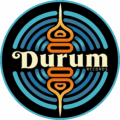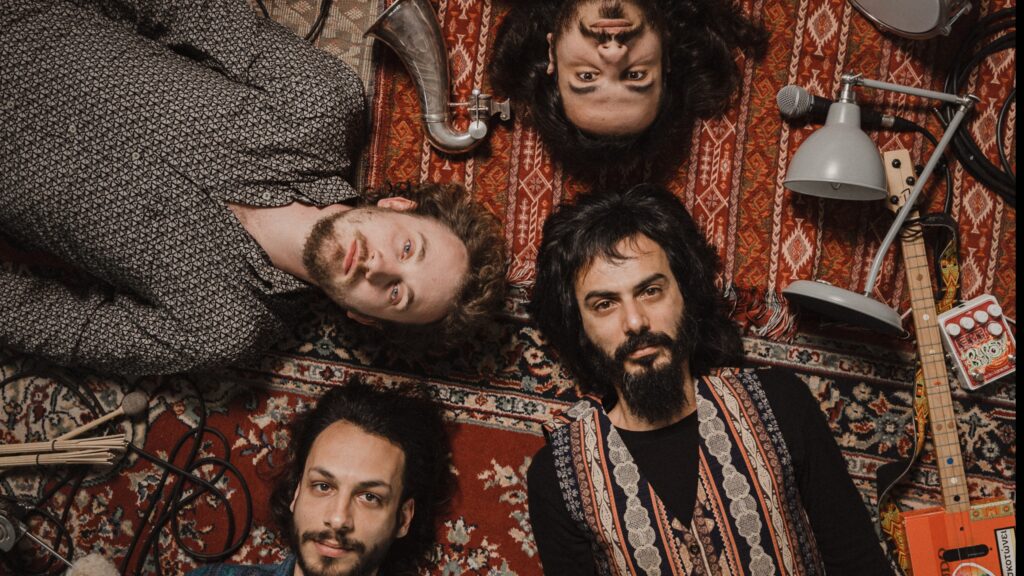Born in the heart of Cyprus, Buzz’ Ayaz is the latest project from Antonis Antoniou, also the mind behind one of his earlier projects Monsieur Doumani. With a raw blend of Rebetiko roots, psychedelic textures, and the growl of a bass clarinet, the band channels both cultural depth and political urgency. We spoke with Antonis about how he experiments with tradition and how music can become a force for connection in a divided world
⸻
Introduction
What does the name ‘Buzz’ Ayaz’ mean?
“Buzz’ Ayaz” is a play on sound and meaning. “Ayaz” is a word we use both in Turkish and in the Greek part of Cyprus, it means wind. “Buzz” is reminiscent of the Turkish word for ice. So it’s a nice word play. But more than the literal meaning, we liked how it sounded. In a way, it also reflects who we are: a bi-communal band from Cyprus, with members from both the Greek-speaking and Turkish-speaking parts of the island that identify themself as true Cypriots. The name symbolizes that shared cultural space, a kind of wind that cuts through division.
How would you describe your music to someone who’s never heard you before?
At its core, our music is built on the scales and melodic lines of the Eastern Mediterranean. You could call it “Psychedelic Mediterranean Folk Rock”. There are strong psychedelic and rock elements, but what gives our sound its identity is the use of modal scales from our region, from the Aegean to the Middle East. The bass clarinet is also essential in shaping our sound.That mix -traditional roots and bold textures – is what defines Buzz’ Ayaz.
Tell us more about that bass clarinet, how did it become part of your sound?
I’ve always been fascinated by the sound of baritone instruments. One of my biggest influences is the band Morphine from Boston. They used baritone sax and bass instead of guitar, creating a dark, raw energy. That idea stuck with me. So when I started Buzz’ Ayaz, I wanted something that could deliver that same depth and intensity — but in our own language. The bass clarinet became our weapon of choice. With the right pedals and effects, it became an aggressive, powerful voice in the band.
What kind of stories do your songs tell?
Many of our songs have an existential or philosophical edge. They touch on the human condition, politics, and the absurdity of the world we live in. I try to write honestly about what bothers me, about the way we treat each other, the injustice and imbalance that seem to define our systems for ages. Music is a way to express that frustration. I believe artists have a responsibility to speak truth, be honest, but also to offer hope. Not in a preachy way, but in a way that opens hearts.
⸻
Roots
What influences have shaped the sound of Buzz’ Ayaz?
Our sound is deeply shaped by the traditional music of our region. Especially Rebetiko, which has been part of my life since childhood. It’s the musical language I feel most connected to. But there are many other layers. King Gizzard & the Lizard Wizard had a big impact and were inspiring to me, especially with their microtonal albums. I’m also drawn to the textures and arrangements of ’70s bands like The Doors and the way how they used space and instrumentation. And of course, legendary Turkish bands like Baba Zula from Istanbul have been a huge inspiration. There are many influences.
What parts of your musical roots feel sacred to you?
Rebetiko music holds a very sacred place for me. It’s something I didn’t consciously choose, it was just always there. Playing in the background of my childhood, through my father. It entered my ears and my soul long before I could understand it. Later, when I moved to Athens to study, I rediscovered it and since then, it has become an obsession. I feel especially connected to the so-called “golden era” of the 1930s, when the bouzouki really defined the sound. Over time, I also came to appreciate later periods, like the harmonically richer Rebetiko of the ’50s and ’60s. But these days, I find myself going back even further, tracing the music to its early roots in places like Izmir and Istanbul. That’s actually the focus of my new solo project: researching and reconnecting with the very beginning of this musical tradition, and finding out how it still lives in me today.
Do you use traditional instruments in Buzz’ Ayaz?
Not in the conventional sense. I play a custom-made instrument that started as a three-string tzouras. I modified it with extra frets to allow for microtonal playing. You could say it’s evolved into an electric saz. It gives me the flexibility to express melodies that sit outside the Western scale, which is essential for the music we make.
What does “fusion” mean to you personally?
Fusion has evolved as a term. In the past, it often referred to obvious combinations like jazz-rock hybrids. But for me, fusion is about exploration. It’s about finding new sounds by blending styles, traditions, instruments, and techniques that don’t usually meet. That process of experimentation is what excites me most as a musician.
What role does your band play in building bridges between cultures?
Buzz’ Ayaz is a bi-communal band and that matters deeply. Until 2003, Greek and Turkish Cypriots couldn’t even cross the border and visit each other’s neighborhoods. Since then, slowly, a few collaborations have emerged. Our band is part of that healing process. We talk about it on stage, and we see how people abroad react. It resonates beyond Cyprus. The world is fractured in many ways, and our little island is just a microcosm of that. But through music, we try to show that another path is possible.
⸻
Live
What feeling do you hope to give your audience during a live show?
It’s a balance. We want people to reflect, to think about themselves, what’s happening in the world, their place in it. But at the same time, there has to be an optimistic feeling. Our sets often start with darker, introspective tracks and then move towards something uplifting. We want to leave people with a sense of hope. Because hope, in the end, is what keeps us going.
What’s a live show you’ll never forget?
Our first European tour, right after releasing our debut album. Buzz’ Ayaz is still a young band – just over two years old – so we didn’t know how people would respond. But from the very first shows, we felt this incredible energy from the crowd. That feedback gave us the strength and motivation to continue. It showed us that what we’re doing matters.
⸻
Inspires
What’s next for Buzz’ Ayaz
We’ve been working on new material and already play a full second album live. At the same time, I’m also working on a solo project that explores the early roots of Rebetiko in Izmir and Istanbul. It’s research-based, and I hope it will lead to an album or performance project in the future.

